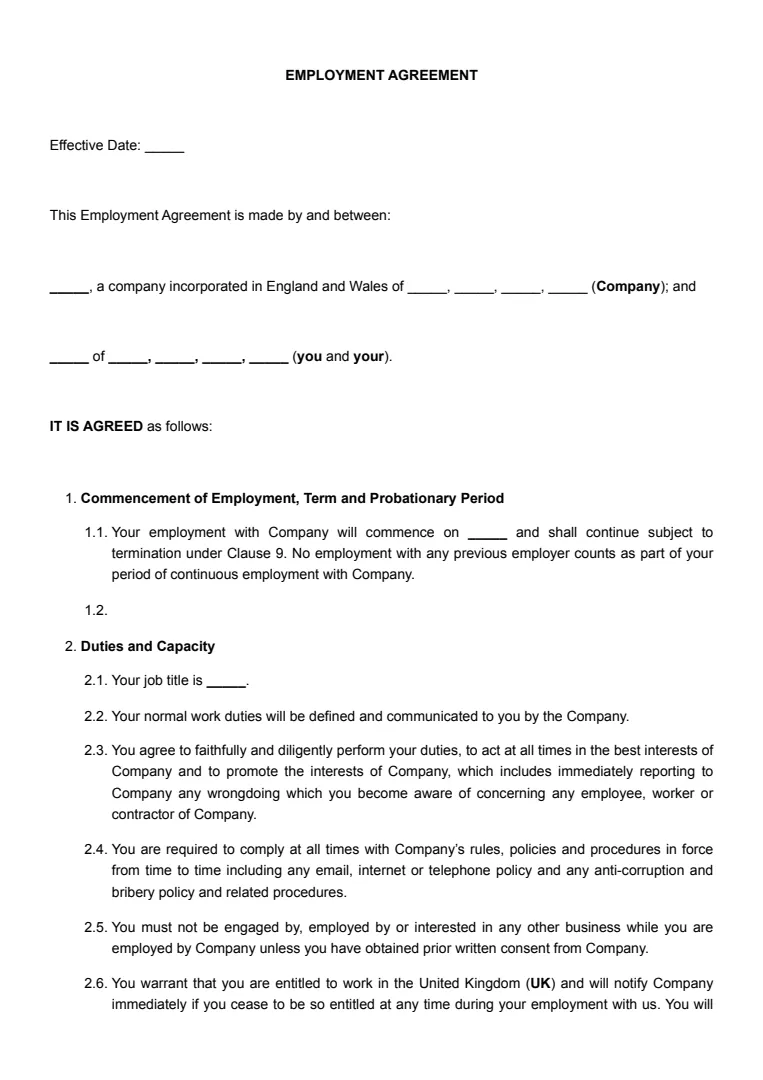What Is an Internship Agreement?
An internship agreement (sometimes called an internship contract, intern contract, or internship employment contract) is a document that formalises the relationship between the intern and the host organisation.
A robust intern agreement template will include essential details such as the duration of the internship, the scope of work, whether the role is paid or unpaid, and any benefits or training the intern will receive. The agreement also protects the organisation by including clauses on confidentiality, intellectual property, and termination.
Under UK law, the classification of the intern determines their rights. If they meet the definition of a “worker” under the National Minimum Wage Act 1998, they are entitled to be paid at least the minimum wage, holiday pay, and rest breaks under the Working Time Regulations 1998. An agreement provides clarity on status, avoiding legal disputes and ensuring compliance.
Expert Tip:
“Always determine the intern’s legal status before drafting the agreement. In the UK, a misclassified intern can trigger back-pay claims and penalties under the National Minimum Wage Act 1998.”
When Should You Use an Internship Agreement?
A written internship contract agreement is advisable in almost all scenarios where an intern will be part of your organisation, whether the arrangement is paid, unpaid, short-term, or long-term. It ensures both parties have a shared understanding of the role, expectations, and legal obligations, reducing the risk of disputes or compliance breaches.
Here are the main instances in which an intern agreement or intern contract should be used.
1. Paid Internships
Whenever you offer a paid internship, you should have a formal agreement in place. In the UK, payment typically means the intern will qualify as a “worker” under the National Minimum Wage Act 1998, entitling them to minimum wage, paid leave, and other statutory rights.
A contract for internship should confirm the pay rate, how and when payment will be made, and any additional benefits or expense policies. This not only ensures compliance but also provides transparency and fairness, which can improve retention and satisfaction during the placement.
2. Academic Credit Placements
If the internship is arranged through a university or college, the arrangement often involves three parties (the employer, the intern, and the educational institution). In such cases, an agreement is vital to clearly define the scope of the role, the learning outcomes, and how performance will be assessed.
It should also specify supervision arrangements, working hours, and any limits on the type of work the intern can perform in line with academic programme requirements. This protects the organisation from taking on responsibilities not agreed in advance and ensures alignment with the academic institution’s expectations.
3. Long-Term Internships
For internships lasting several months, the contract should include more details on role development, training commitments, and review points throughout the placement. Extended internships increase the likelihood of role changes, so the agreement should allow for potential adjustments to duties or working arrangements, while maintaining legal compliance.
A clear clause on notice periods is particularly important here, as longer placements often require greater planning if either party wishes to end the arrangement early.
4. High-Responsibility Internships
If an intern will handle confidential information, manage client relationships, or contribute to proprietary projects, the agreement should contain robust confidentiality and intellectual property clauses. These provisions safeguard sensitive business information and make clear who owns the rights to any work produced. Including data protection obligations in line with the Data Protection Act 2018 and UK GDPR guidance ensures that the intern understands their legal duties when handling personal or business data.
Expert Tip:
“If an intern will access client data, confidential reports, or proprietary software, ensure your agreement includes both confidentiality and intellectual property clauses that survive beyond the internship end date.”
5. Short-Term Placements
Even when the internship is only for a few weeks, a written agreement is still beneficial. Short-term arrangements can create ambiguity if responsibilities, working hours, and supervision expectations are not agreed upon up front.
By setting out these terms in writing, you minimise the risk of misunderstandings and ensure both parties can refer to the agreement if questions arise during the placement. This can be especially important in fast-paced work environments where tasks and priorities change quickly.
How to Write an Internship Agreement
A well-written internship contract template should be precise, tailored to the specific role, and aligned with UK employment law. It should not only list terms but also anticipate potential areas of misunderstanding. The aim is to produce a document that sets clear expectations, complies with relevant legislation, and protects both parties if the arrangement ends prematurely.
Here is a step-by-step guide to creating internship contracts.
Step 1: Identify the Parties
Clearly state the full legal names and addresses of both the organisation and the intern. If the employer is a limited company, include its registered company number and official registered office address as recorded at Companies House.
This removes ambiguity over which legal entity is entering into the contract and ensures enforceability in the event of a dispute. For internships involving international students, consider including passport or visa details to confirm the right to work in the UK.
Step 2: Define the Role and Responsibilities
A detailed job description is essential to avoid scope creep and performance disputes. Outline the specific tasks the intern will carry out, the tools or software they will use, and any supervision or reporting structures.
For example, instead of “assist the marketing team,” specify “draft social media posts, track engagement metrics, and attend weekly campaign meetings.” Where the internship includes learning goals, such as skill development or exposure to certain departments, state these clearly so both parties can assess progress at the end of the placement.
Step 3: Set the Duration
Include a clear start date, end date, and, if applicable, review or extension clauses. Longer internships may benefit from a mid-point review to assess performance and adjust responsibilities. Where the role is linked to an academic timetable, align the contract’s duration with university term dates or project deadlines.
For seasonal roles, such as summer placements, specifying that the agreement will end automatically without the need for notice can prevent confusion.
Step 4: Confirm Pay and Expenses
If the role is paid, the paid internship agreement should clearly state the hourly or weekly rate, the payment frequency, and whether payment will be made via payroll. Also, detail whether overtime is permitted and how it will be compensated.
For unpaid internships, specify the legal justification, such as participation in a formal higher education programme or voluntary role, to ensure compliance with the National Minimum Wage Act 1998. Include a section on reimbursable expenses, stating whether they require prior approval, how claims should be submitted, and the timeframe for reimbursement.
Expert Tip:
“Clearly outline expense reimbursement rules in writing, including approval processes and deadlines for claims. This prevents disputes and ensures HMRC compliance on taxable and non-taxable expenses.”
Step 5: Outline Working Hours
Set out the standard working schedule, including start and end times, total weekly hours, and any flexibility arrangements. If hybrid or remote work is an option, include expectations on availability, communication, and use of company equipment.
Ensure that hours comply with the Working Time Regulations 1998, which require rest breaks and limit average weekly hours to 48 unless an opt-out agreement is signed. For interns under 18, remember that stricter limits apply.
Step 6: Notice Period and Termination
The notice period for internship (required for either party) to end the agreement early should be clearly defined. This might be one week for short-term placements or two to four weeks for longer arrangements.
Specify the acceptable forms of notice (e.g., written letter, email) and outline the circumstances in which termination may occur without notice, such as gross misconduct, breach of confidentiality, or failure to meet agreed academic requirements. This provides clarity and legal backing if the internship needs to end unexpectedly.
Step 7: Include legal protections
Protect your organisation by including confidentiality clauses covering both commercial and personal data, in compliance with the Data Protection Act 2018 and UK GDPR guidance. If the intern will create work during their placement, clarify intellectual property ownership, typically assigning all rights to the organisation.
Add a dispute resolution process, such as requiring mediation before legal proceedings, to minimise costs and disruption. Where appropriate, include clauses on health and safety compliance and safeguarding if the intern will be working with vulnerable individuals.
Legally.io’s free internship agreement template and sample internship agreement already include all these clauses, saving you hours of drafting and reducing the risk of missing critical protections.
What Should an Internship Agreement Contain?
A comprehensive internship agreement example for UK use should contain:
- Parties’ details – Full names, addresses, and company registration numbers if applicable.
- Role description – Detailed explanation of duties, learning objectives, and expected performance standards.
- Duration – Fixed start and end dates, plus any probationary or review periods.
- Pay and expenses – Amount, payment schedule, and reimbursement rules, clearly distinguishing between salary and expenses.
- Working hours – Number of hours per week, start and finish times, and flexibility provisions.
- Notice period – Agreed length and process for resignation or termination.
- Confidentiality – Commitment not to disclose sensitive or proprietary information.
- Intellectual property rights – Clarification on ownership of work created during the internship.
- Data protection – Compliance with UK GDPR, including handling of personal data.
- Dispute resolution – Agreed steps to address conflicts, such as mediation before legal action.
The more precisely these elements are defined, the lower the risk of misunderstandings and legal exposure.
Legal Tips for Internship Agreements
Here are some expert tips to bear in mind when drafting an internship agreement.
- Define intern status accurately
Incorrectly classifying an intern as unpaid when they qualify as a worker can result in back-pay claims and reputational damage. Review the actual duties, not just the job title, to determine legal status. - Include statutory rights where applicable
If the intern is a worker, include holiday entitlement, rest breaks, and minimum wage requirements directly in the contract to ensure compliance with UK employment law. - Protect sensitive business information
Confidentiality clauses should apply during and after the internship. If the intern will work on creative or technical projects, include clear intellectual property terms to ensure your organisation retains ownership. - Address health and safety obligations
The Health and Safety at Work etc. Act 1974 applies to interns as it does to employees. Outline safety rules, induction procedures, and any required training in the agreement.
Expert Tip:
“Review and update your internship agreements annually to reflect changes in UK employment law, data protection rules, and your organisation’s internal policies.”
Key Takeaways
An internship agreement is more than just a formality — it’s a legal safeguard for both the employer and the intern.
It sets expectations, defines rights and responsibilities, and ensures compliance with UK law.
Clear drafting prevents disputes, protects sensitive information, and creates a professional foundation for the internship.
By using Legally.io’s legally compliant, well-structured agreement, you can focus on delivering a valuable and mutually beneficial internship experience.
















